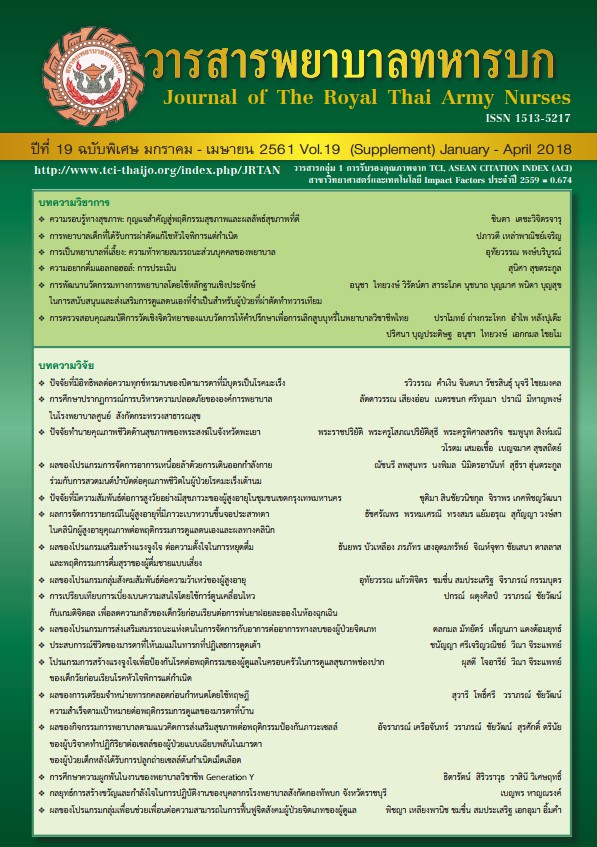The Effects of A Motivation Enhancement Therapy Program with Family Involvement on The Medication Adherence of Inpatients With Co-Occurring Schizophrenia and Alcohol Use Disorder
Keywords:
co-occurring schizophrenia and alcohol use disorder, motivation enhancement therapy, medication adherence, family involvementAbstract
The purpose of this quasi-experimental research was to investigate the effects of the Motivation Enhancement Therapy Program with family involvement (METF) on the medication adherence of inpatients with co-occurring schizophrenia and alcohol use disorder. The sample included fifty-six inpatients with co-occurring schizophrenia and alcohol use disorder, aged between 20 and 59 years, and assigned to the experimental and control group, with 26 subjects in each group. The experimental group received six sessions of the Motivation Enhancement Therapy Program with family involvement, 45-60 minutes each session for four weeks. The research instruments consisted of the following: 1) the Motivation Enhancement Therapy Program with family involvement; 2) stage of change assessments; 3) a medication compliance questionnaire; and 4) a motivation questionnaire. All of the instruments were validated for content validity by professionals. The reliability of the instruments with Chronbach’s alpha coefficients was .81, .81, and .84. The data were analyzed using descriptive statistics and t-test. The findings were as follows: 1) The medication adherence of co-occurring schizophrenia and alcohol use disorder patients after receiving the group METF was significantly higher than before receiving the group METF at the .001 level. 2) The medication adherence of the co-occurring schizophrenia and alcohol use disorder patients that received the group METF was significantly higher than that of the individuals that received routine care at the .001 level.
Downloads
References
2. Koskinen J, Lohonen J, Koponen H, Isohanni M, Miettunen J. Prevalence of alcohol use disorders in schizophrenia--a systematic review and meta-analysis. Acta Psychiatr Scand. 2009; 120(2):85-96.
3. Junsirimongkol B, Suriyachai S, Vitayatawonwong L, Dalakorn na ayuthaya P, korngumjayrit K, Kunaluk A. Integrated Co-Occuring psychiatric, Substance and alcohol use Disorders Rehabilitation revised Program (ICOD-Rr model). 2014
4. Manning V, Betteridge S, Wanigaratne S, Best D, Strang J, Gossop M. Cognitive impairment in dual dual diagnosis inpatients with schizophrenia and alcohol use disorder. Schizophr Res. 2009; 114(1-3):98-104.
5. Suriyoung J, Viboonma K, Keawma P, Khamwongpin M, Tamdee D, Prevalence of alcohol use disorder of schizophrenic patients. Journal of Mental Health of Thailand. 2014; 22(1). 38-47. (inthai)
6. Green A. I, Drake R. E, Brunette M. F, Noordsy D. L. Schizophrenia and co-occurring substance use disorder. American Journal of Psychiatry. 2007
7. Barrowclough C, Haddock G, Tarrier N, Lewis S. W, Moring J, O’Brien R, McGovern J. Randommized Randomized controlled trial of motivational interviewing, cognitive behavior therapy, and family intervention for patients with comorbid schizophrenia and substance use disorders. American Journal of Psychiatry. 2001
8. Maneesakorn S, Robson D, Gournay K, Gray R. An RCT of adherence therapy for people with schizophrenia in Chiang Mai, Thailand. Journal of clinical nursing. 2007; 16(7), 1302-1312.
9. Novick D, Haro JM, Suarez D, Perez V, Dittmann RW, Haddad PM. Predictors and clinical consequences of non-adherence with antipsychotic medication in the outpatient treatment of schizophrenia. Psychiatry Res. 2010;176(2-3):109-13.
10. Higashi K, Medic G, Littlewood KJ, Diez T, Granstrom O, De Hert M. Medication adherence in schizophrenia: factors influencing adherence
and consequences of nonadherence, a systematic literature review. Ther Adv Psychopharmacol. 2013; 3(4):200-18.
11. Acosta FJ, Bosch E, Sarmiento G, Juanes N, Caballero-Hidalgo A, Mayans T. Evaluation of noncompliance In schizophrenia patients using electronic monitoring (MEMS) and its relationship to sociodemographic, clinical and psychopathological variables. Schizophr Res. 2009;107(2-3):213-7.
12. Tham XC, Xie H, Chng CM, Seah XY, Lopez V, Klainin-Yobas P. Factors Affecting Medication Adherence Among Adults with Schizophrenia:
A Literature Review. Arch Psychiatr Nurs. 2016;30(6):797-809.
13. McAdams H. The Effects of a Motivational Interview on Adherence to Recommended Outpatient Aftercare Treatment. 2016 (10109487). Available from Pro Quest Dissertations & Theses Global.
14. Miller W. R. Motivational enhancement therapy manual: A clinical research guide for therapiststherapists treating individuals with alcohol abuse and dependence.1995. DIANE Publishing.
15. Noordraven EL, Wierdsma AI, Blanken P, Bloemendaal AF, Mulder CL. Depot-medication compliance for patients with psychotic disorders: the importance of illness insight and treatment motivation. Neuropsychiatr Dis Treat. 2016;12:269-74.
16. Drake RE, O’Neal EL, Wallach MA. A systematic review of psychosocial research on psychosocial psychosocial interventions for people with co-occurring severe mental and substance use disorders. J Subst Abuse Treat. 2008; 34(1):123-38.
17. Pantaewan P. Self-Efficacy Theory and Smoking Cessation. Journal of The Royal Thai Army Nurse Army Nurses 2017; 18(3) 35-43. (in thai).
18. Miller W. R, Rollnick S. Motivational interviewing: Helping people change. 2012 Guilford press.
19. Wangworatrakul W, Suwannaroop N, Moopayak K. Factors Predicting to Medication Adherence among Patients with Essential Hypertension.
Journal of The Royal Thai Army Nurses 2017; 18(1) 131-139. (in thai).
20. Smeerdijk M, Keet R, Van Raaij B, Koeter M, Linszen D, Haan L, Schippers G. Motivational interviewing and interaction skills training for parents of young adults with recent-onset schizophrenia and co-occurring cannabis use: 15-month follow-up. Psychological medicine. 2015;45(13), 2839-2848.
Downloads
Published
How to Cite
Issue
Section
License
บทความหรือข้อคิดเห็นใดใดที่ปรากฏในวารสารพยาบาลทหารบกเป็นวรรณกรรมของผู้เขียน ซึ่งบรรณาธิการหรือสมาคมพยาบาลทหารบก ไม่จำเป็นต้องเห็นด้วย
บทความที่ได้รับการตีพิมพ์เป็นลิขสิทธิ์ของวารสารพยาบาลทหารบก
The ideas and opinions expressed in the Journal of The Royal Thai Army Nurses are those of the authors and not necessarily those
of the editor or Royal Thai Army Nurses Association.






